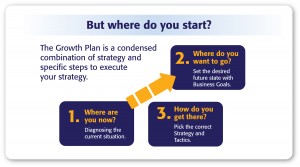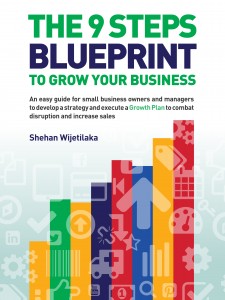What is a Growth Plan
by Shehan Wijetilaka | CEO, Grow Strategy Pty Ltd
Do you want to grow your business faster than your competition?
A Growth Plan enables you to plan and track the growth in your business revenue. It allows you to be more efficient in generating new revenues by focusing on the value that customers can see. It allows you to differentiate yourself from your competition.
Growth Plans compared to Business Plans and Strategic Plans
Don’t let innovation disrupt you. A Growth Plan combats disruption – and takes advantage of it.
So, what is the recipe for a Growth Plan?
Remove all sections of a business plan that don’t directly impact customers, shrink your Strategic Plan to 12 months, add rapid execution and you get a Growth Plan”
Growth Plans are nimble and typically targeted for 1-2 years or less. It must be agile and able to adapt as market conditions change. The tactics in a Growth Plan uses short sprints in 90-day cycles. This ensures execution is rapid and any lessons learnt is fed-back to fine-tune the Growth Plan for the next sprint, in near real time.
Business Plans are very useful to gain external funding from banks or investors. In contrast, a Growth Plan provides a deeper dive by exploding the “go-to-market” section that is typically seen in a Business Plan into a more granular plan on how to engage and create value for customers to move the revenue dial.
As the pace of change accelerates in society and customer buying patterns change, a Growth Plan provides a more realistic method of planning and execution than traditional Strategic Planning which typically looks at a longer 3-5 year time frame.
The essentials of a Growth Plan
A Growth Plan should only contain elements that customers can see direct relevance and value from engaging with your business. A Growth Plan has 9 steps ; it starts with business goals that point the business in the correct direction. A Growth Plan also spells out the strategies and tactics for reaching these goals.

In the absence of a Growth Plan, many businesses suffer from multiple knock-on effects that impact revenue growth.
Growth Plans are inherently strategic – it focusses only on Revenue generation. (Reference: the most fundamental equation in commerce: Profit=Revenue-Cost). It lays out the plan that relates directly to the organic growth of a business.
It enables you to connect your business goals and chosen strategies with coherent actions at the coal-face that have a direct impact on clients – to both protect existing revenue and generate new revenue.
Developing a Growth Plan should be a rewarding experience, not a daunting task that keeps getting postponed. It should enable you to clarify and prove to yourself first how you plan to generate revenue.
So how do we start the growth planning process?
The Growth Plan is a combination of strategy and specific steps to implement that strategy to help achieve your business goals. The plan makes the connections between the different functions that create value for your clients by examining:

Where are you now? Where do you want to go? How do you get there? These questions translate into a 3 pronged-examination of:
- Current State: You start the plan with a defined set of resources.
- Future State: You want to get to a point in the future (usually 1 to 2 years) at which point in time your business will have a different set of resources and capabilities.
- Bridging the Gap: Your plan shows how you will get to the desired future state.
The critical section from the output report is the action plan that you will use to:
- gain buy-in from other stakeholders such as staff and external advisers, and
- track progress and fine-tune the growth plan from your findings in execution
A well crafted Growth Plan enables you to take advantage of disruptive changes in the customer buying patterns, set meaningful priorities, and understand the need to pursue results in a systematic and methodical manner to ensure success.
Ready to act? Make a quick start with your online growth plan now.


